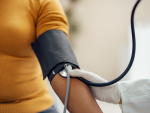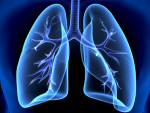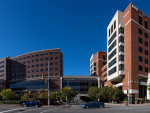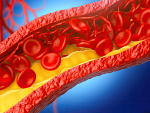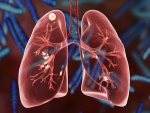Displaying items by tag: department of medicine
UAB researchers leverage data from the SPRINT trial to show that intensive control of blood pressure reduces troponin I levels and this decrease in troponin I levels is associated with reduced risk of cardiovascular disease.
Although living with his congenital heart defect has come with its challenges, Bill Wingate hopes he can encourage others with similar conditions.
Tagged under
Tagged under
A post-hoc analysis of critically ill COVID-19 patients revealed that high-dose inhaled nitric oxide therapy was more beneficial in reducing the risk of mortality in Black patients compared with their white counterparts.
At 15 months old, Brooke Miley Lillie received a heart transplant. At 19, she received a kidney. At 27, she defied the odds and delivered her first daughter at UAB Hospital.
Tagged under
- release
- department of surgery
- division of cardiothoracic surgery
- division of transplantation
- comprehensive transplant institute
- department of medicine
- division of cardiovascular disease
- division of nephrology
- department of obstetrics and gynecology
- division of maternal fetal medicine
- department of pediatrics
- division of neonatology
- women and infants services
- uab hospital
Tagged under
After having a below-the-knee amputation, former SEC football player Ka’Darian Hill is using his story to motivate and inspire others.
Tagged under
A UAB infectious diseases physician breaks down what you need to know about flu, RSV and COVID as people navigate colder months and have exposure to these viruses.
Tagged under
The MyLupus app is a patient-friendly, patient-focused decision-aid tool for people from all backgrounds with moderate to severe lupus.
Tagged under
UAB Hospital practice areas were honored with the “Best Hospital” designation, including cancer care, heart care, stroke care, minimally invasive surgery, comprehensive breast care, mammograms, obstetrics and women’s services.
Tagged under
Tagged under
A UAB expert is offering some of their top tips on how to avoid holiday heart syndrome and enjoy a heart-healthy holiday season.
Tagged under
Sickle cell disease is the most common and clinically significant inherited blood disorder across the nation, and now there is an FDA-approved gene therapy to help those living with SCD.
Tuberculosis, the world’s leading infectious disease killer, caused 1.6 million deaths in 2021, along with 10 million new cases of tuberculosis every year.
Tagged under
Vivek Lal, M.D., associate professor in the Department of Pediatrics at UAB Heersink School of Medicine and the founder of both ResBiotic Nutrition and Alveolus Bio, was given the 2023 Award for Excellence in Entrepreneurship.
Tagged under
- release
- harbert institute for innovation and entrepreneurship
- school of medicine
- department of pathology
- department of pediatrics
- department of urology
- department of medicine
- division of pulmonary allergy and critical care medicine
- department of biochemistry and molecular genetics
- college of arts and sciences
- department of biology
- department of chemistry
- school of engineering
One UAB experts says the roles of screenings, warning signs and a healthy lifestyle are all keys to cancer prevention.
Tagged under
After a loved one receives a breast cancer diagnosis or surgery, it is important for caregivers and support partners to know how they can best help the patient during the difficult time.
Tagged under
The academy provides a forum where knowledge and skills are developed and refined to support community leaders as they conduct planning and improvement projects, balance needs and resources, and secure funding that ignites change.
Tagged under
Tagged under
Analysis of a survey of 18,041 people in rural KwaZulu-Natal revealed a discrepancy between the ability of the South African health system to respond to the health needs of people with communicable diseases and the health needs of people with non-communicable diseases.
Tagged under
